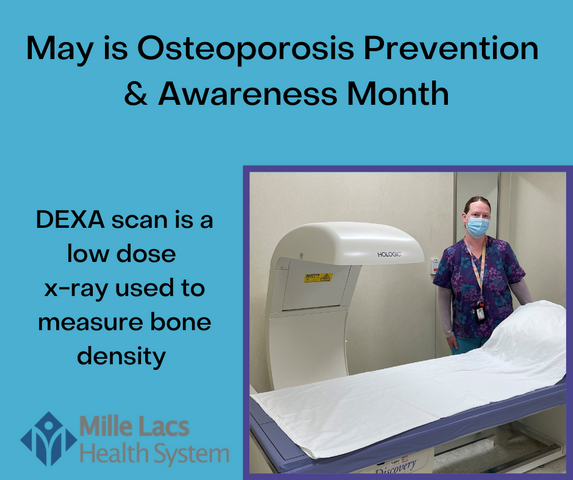
May is Osteoporosis Awareness & Prevention Month. Bone is living tissue that is constantly being broken down and replaced. Osteoporosis occurs when the creation of new bone doesn’t keep up with the loss of old bone. The regenerative bone process naturally slows as the body ages leaving bones more brittle. Osteoporosis can often lead to bone fracture. The most common fractures occur in the hip, wrist, or spine.
Peak bone mass (the strongest and densest bone an individual can achieve) is often reached in the mid-20s. Regular exercise (focusing on muscle strengthening and weight-bearing) and a healthy diet with appropriate amounts of calcium and vitamin D are key to strong bones. Other factors that can help avoid osteoporosis include: not smoking and limiting alcohol consumption.
One of the key risk factors involved in having osteoporosis is gender. Women, especially those past menopause and who are White or Asian have the highest risk of occurrence. According to the National Osteoporosis Foundation (NOF), one in two women and up to one in four men will break a bone in their lifetime due to osteoporosis. For women, the incidence is greater than that of heart attack, stroke, and breast cancer combined.
Approximately 10 million Americans age 50 and older have osteoporosis, and an additional 44 million Americans have low bone density, placing them at an increased risk for bone fractures.
If you’ve fractured a bone and you’re over the age of 50, had an illness that put your bone health at risk, or have taken some medications such as: steroid prednisone, cancer drugs, and drugs used after organ transplant, you may want to inquire with your medical provider whether a bone scan is right for you. The NOF recommends females of average risk over age 65, and males over 70 years old also have regular bone scans.
A DEXA (Dual-energy X-ray absorptiometry) scan is a low dose x-ray that measures the bone mineral density. It is a quick and painless bone scan. You can get a DEXA scan in Onamia at Mille Lacs Health System. Inquire with your primary medical provider if you fall into any of the risk categories or have concerns regarding your bone health.
Mille Lacs Health System 320-532-3154
About the Business
(36 reviews)
Have a question? Ask the experts!
Send your question

